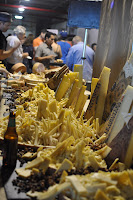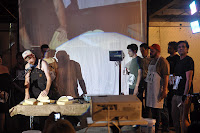Six months ago I made a cheese-related purchase that has haunted me. Finding myself alone in New York at Christmas, I treated myself to a fancy dinner and a new book. The book, part of a trilogy, was so hilariously titled and so amusingly blurbed on Amazon (you read it here first; blurb can become a verb) that I was ready to flaunt its sarcastic, nonsensical, tongue-in-cheek humor like a 2005 hipster wearing a Gettin Lucky in Kentucky t-shirt.
Sitting before the first course of my holiday prix fixe, I proudly opened page one of....ahem...The Long Quiche Goodbye, the first book in The Cheese Shop Mystery series (Lost and Fondue and Clobbered by Camembert being the other two). I was promised a modern-day Agatha Christie-esque murder mystery set in a small-town cheese shop, with the odd bonus of recipes in the back. What I got was an embarrassment that I forced myself to read a few pages at a time on the subway, doing my best to completely shield the front cover from onlookers with my hand and GIANT bookmark.
I wasn't expecting Dickens but I had high hopes for a bit of sarcastic cheese humor peppering a moderately captivating mystery story. Six months later, I would sooner eat waxed Gouda rinds than read the next two books in the series.
By the book's third sentence, the main character/first-person narrator was name-dropping a Humboldt Fog-Chardonnay pairing like it was a revelation. What the hell kind of lead is that? Would Agatha Christie use the first page to tell me what biscuits and finger sandwiches she likes best with her tea?! As a sidenote, if you work in cheese, that writer has just lost all credibility by trying to pull you in with that lame as hell nugget of information. But even the average Joe pleasure reader demands a little more literary skill in subtly finessing a quirky theme.
It's set in a cheese shop. That's cute. The main character is in love with a local cheesemaker. That's believable. Really, that's pretty much all you need. But the book just ....goes....on.... with stilted, awkward (and sometimes obscure) cheese references, pairing suggestions, and flavor descriptions. If cheese must become a bigger player in literature, there must be some way of using the craft or vocation as a silent backdrop character like what authors do with a city or home. With this book, however, I'm bombarded with already awkward flirtations between the love interests interrupted with talk of Tomme Crayeuse paninis.
In the ultimate "heated" confrontation with the killer we get these gems of internal conflict in the protagonist's head:
"Hurling something was out of the question. I stunk at softball, hence the concussion I suffered in high school. I would miss my mark. Besides, getting whacked by china teacups probably wouldn't make [killer's name] drop the knife."
"I didn't say what I was thinking out loud. As Tyanne would say, I hadn't fallen off a turnip truck."
I wish you hadn't said the last 290 pages of what you were thinking out loud on all of this wasted paper! The only thing dumber than any of this is me for continuing to read. But when I spend money on something, I'm like Homer Simpson with a sandwich. I refuse to waste it, even if it's so bad that it gives me nightmares and makes me throw up and hallucinate.
By the end, I was at least hoping for one of those surprising (but not really surprising anymore because it happens all the time now) second-ending twists utilized in scary movies. But why, WHY, would I not just have expected the last sentence to be "...flashing on something Rebecca had said. Perhaps danger was not only becoming her middle name but mine, as well."
I think I might have used a similar ending in a 5th grade essay about tornadoes. It was a pretty good essay, for a 5th grader.





